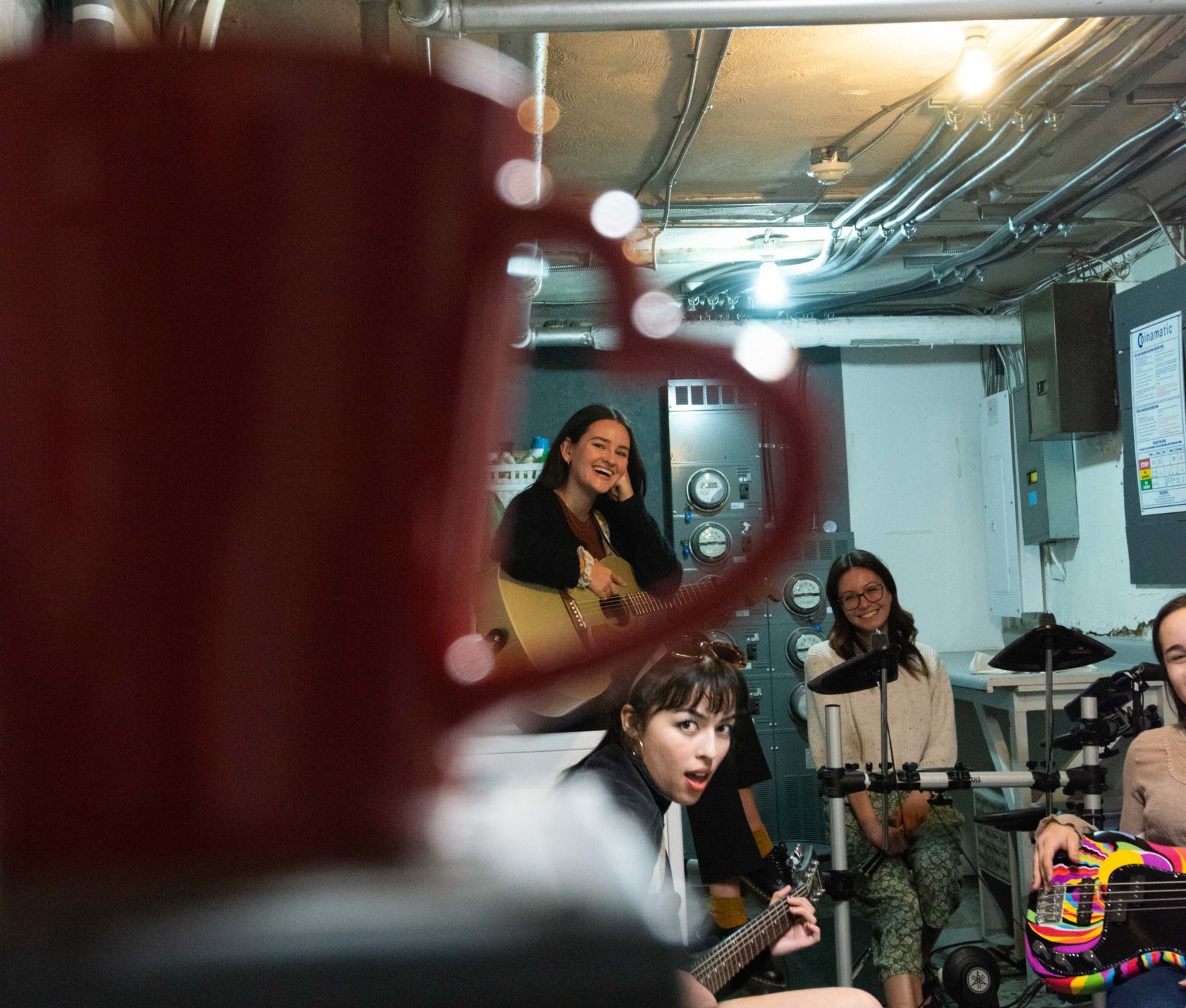By Jeff Friesen

“In general, we’re all just feeling a bit more brighter,” says Christopher Bear, drummer and vocalist for Grizzly Bear, describing reasons for the sound of Veckatimest, the band’s latest release. It’s a record that sees the Brooklyn-based folk rockers take their melancholic, quasi-traditional Americana style and brighten it up. And why not feel brighter? In 2006 the group released Yellow House, their second full-length and first as a four-piece, to critical acclaim. This set off a whirlwind of unanticipated events: tours with the likes of TV on the Radio, Feist and, more recently, Radiohead as well as the release of another solid disc, the Friend EP, for which the band reworked a number of its older songs with grander instrumentation and production. Things are most certainly coming together for the band, and with Veckatimest it’s clear that the band’s enthusiasm and excitement is making for some blissful pop music.
Veckatimest features sonic textures and lyrical themes the band has yet to fully explore, but it doesn’t sound out of place among the band’s previous works. Grizzly Bear began as a solo project of guitarist/vocalist Edward Droste, who put together a moody and heartbreaking song cycle in 2004’s Horn of Plenty. It was a record that, backed for the most part by guitar and the occasional splash of drums and keyboards, portrayed the hidden beauty of broken and despondent relationships. Soon after its release he added Christopher Bear, multi-instrumentalist Chris Taylor and guitarist/vocalist Daniel Rossen to the mix, paving the way for the sounds found on Yellow House and the Friend EP, sounds which were much larger and more polished.
With these additions, the band faced new challenges and possibilities in regards to songwriting. “Starting Yellow House, a lot of the songs were fully written before we recorded,” Bear explains. “It was less focused on how we write together and more focused on how we record and arrange songs together. Friend came about because we were touring for a long time, and there were things we started to do live that were different than on the record and we wanted to capture that, just because after playing so many shows the band was really starting to change.” The band was in transition, shifting from its original DIY, bedroom-recording aesthetic to a fuller and more complex sound.
With Veckatimest this transition appears to be reaching its fullest potential yet. “I think we are more familiar with how we play live,” says Bear. “A lot of this stuff came about in a live setting. Songwriting wise, the songs were in everybody’s hands at a much earlier stage.” The band members were collaborating in new ways. “There really are a lot of different permutations of people writing on different songs, which gives Veckatimest sort of a different story. It certainly feels much more organic, a sort of growing together.”
This new approach to songwriting—giving each band member more say in the whole process—has resulted in a sound more stripped down than Yellow House’s yet still very complex. Whereas previously the band would add layer upon layer of instrumentation and vocals onto their tracks, the songs on the new record are sparser, allowing more space for the band’s primary instruments—guitar, piano, drums and voice—to work with. “With Yellow House, we continued to stack more onto each song. At times it felt like we were throwing the kitchen sink onto every song, which was really exciting for us at the time,” Bear recalls. “We were figuring out how we work together and what certain textures we were fit to explore. I think with Veckatimest we were using a lot of the same things we learned, but focusing it more, not afraid to do a song with just piano and voice, or just a single vocal track.”
For example, “Fine For Now” features instrumentation that is much simpler than what we have grown to expect from Grizzly Bear. It consists of nothing more than drums, guitar and vocals with some occasional splashes of keyboards. However, the way the band works together, playing on each other’s strengths, the song remains equally, if not more intense than much of the band’s previous material. Grizzly Bear has made good writing music that sounds simpler than it actually is, freeing the music from clutter.
This more open sound is evident in the record’s poppy moments, such as Rossen’s song “While You Wait for the Others,” the bouncy “Cheerleader” and the album’s centerpiece, “Two Weeks,” a stunning track that features Droste at his best, backed by captivating “whoa-oh-oh” harmonies. And it’s these pop hits that will first draw you in.
But it’s the album’s darker moments that really exhibit how creative the band is. On first listen you might say Veckatimest reveals the band becoming less melancholic. “There are some brighter tones to the record; there still is also some more moody material that feels more spacious,” says Bear. Songs such as the lead-off track, “Southern Point,” and “All We Ask”, both which feature string arrangements by Nico Muhly, hold the record together, demonstrating command of lyrical themes and sonic textures.
Perhaps it’s growing together as a band that’s informed much of the record’s lyrical content, as the songs, for the most part, deal with the struggles and joys inherent in the developing of relationships. On “All We Ask” the band chants, “I can’t get out of what I’m into with you.” On “Ready, Able” Ed Droste repeats, “Before we go, I want you to know, what I did.” Relationships are instrumentally or lyrically at the fore.
Veckatimest has been one of the most talked about and hyped-up records of the year and it’s well-deserved. Rarely does an album display a band collaborating so effectively—taking on specific themes and ideas without being afraid to leave things ambiguous in the end. It’s a fascinating listen.

